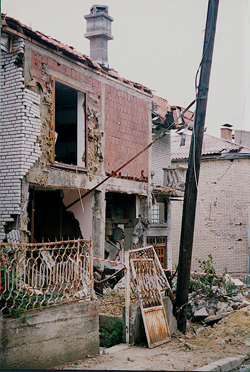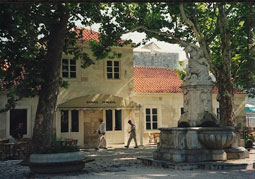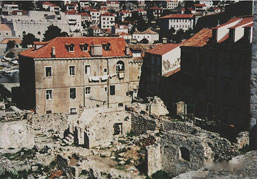Excerpt from Twilight of Impunity
Preface: A Personal Note
For nearly three years, I sat in a courtroom in The
Hague, observing what was billed as “the trial of the
century.” Slobodan Milošević was accused of sixty-six counts
of war crimes, crimes against humanity and genocide for his
role in the decade-long conflict that tore Yugoslavia apart,
leaving over 100,000 people dead, millions displaced and a
way of life destroyed. His path to the courtroom was one of
power, carnage and hubris brought low. Mine evolved over a
five-year odyssey that began in Belgrade in 1997, when
Milošević was still Serbia’s president. I was sent by the
American Bar Association’s Central and East European Law
Initiative (ABA/CEELI) ) to assist a group of dissident judges establish an
independent judges’ association and to support other rule of
law efforts. A year after fighting ended in Bosnia and
Croatia, Milošević's power was shaken by three months of
Serbian demonstrations against his autocratic rule. After the
democratic opposition squandered its victory through
infighting, Milošević reasserted authority by fomenting yet
another war to drive the majority Albanian population out of
Kosova. When NATO began bombing Serbia and Montenegro and
hundreds of thousands of refugees poured over the borders, I
left for Macedonia to document what was happening. The
stories we gathered from refugees – of rape, murder,
beatings, property destruction, looting and forced
deportation – formed part of the data used by the ICTY to
indict and prosecute Slobodan Milošević.
crimes against humanity and genocide for his
role in the decade-long conflict that tore Yugoslavia apart,
leaving over 100,000 people dead, millions displaced and a
way of life destroyed. His path to the courtroom was one of
power, carnage and hubris brought low. Mine evolved over a
five-year odyssey that began in Belgrade in 1997, when
Milošević was still Serbia’s president. I was sent by the
American Bar Association’s Central and East European Law
Initiative (ABA/CEELI) ) to assist a group of dissident judges establish an
independent judges’ association and to support other rule of
law efforts. A year after fighting ended in Bosnia and
Croatia, Milošević's power was shaken by three months of
Serbian demonstrations against his autocratic rule. After the
democratic opposition squandered its victory through
infighting, Milošević reasserted authority by fomenting yet
another war to drive the majority Albanian population out of
Kosova. When NATO began bombing Serbia and Montenegro and
hundreds of thousands of refugees poured over the borders, I
left for Macedonia to document what was happening. The
stories we gathered from refugees – of rape, murder,
beatings, property destruction, looting and forced
deportation – formed part of the data used by the ICTY to
indict and prosecute Slobodan Milošević.

When the war ended and Serb forces withdrew from Kosova, I returned
to work in Montenegro, then went home to the US for a respite that included
my mother’s last year of life and her death. In the meantime, the Serbian
people ousted Milošević from power and, one year later, their new,
reform-minded prime minister, Zoran Djindjic, orchestrated his handover to
the ICTY, responding to pressure from the United States. Milošević would
stand trial for the most grievous crimes associated with his ten-year reign
of destruction. When the Coalition for International Justice, a human rights
organization in Washington, offered me a front-row seat at his trial, I
jumped at the chance to see law applied to the man who had used it as a tool
to distort reality at great cost to people and to the rule of law itself.
This book is my account of the trial, from the beginning to its bitter
end over four years later. It is not the definitive trial record, nor
entirely objective. Who we are -- our values, interpretation and worldview
-- determines what we see. My years in the former Yugoslavia inform my point
of view. The trial of Slobodan Milošević is more personal for my having
lived under his rule and seen the havoc he made of people’s lives – Serbs as
well as Montenegrins, Bosniaks, Kosovars and Croats, friends and colleagues
as well as strangers.
In March 1998 I sat on a couch in Pristina, Kosova, looking
at photographs of massacred civilians, men, women and children,
some horribly disfigured from being shot at close range. At a
Women in Black conference I listened to Bosnian women from Gorazde describe how they survived a multiyear siege and
bombardment of their city, Muslims and Serbs looking out for one
another. In Belgrade, I walked past a legless veteran who was no
longer of any use to the army that left him to beg on the
streets for survival. A friend in Montenegro told me of a woman
badly beaten by her husband, who threatened to kill her when she
confronted him about sexual assaults he had committed during the
war. I saw the bullet-ridden skeletons of buildings and houses
in Sarajevo, Vukovar, Mostar and Dubrovnik; the yellow ribbons
marking off areas still mined years after the war; soldiers
carrying Kalashnikovs running in formation through the streets of
Belgrade, just as they had walked the streets of Pristina to
intimidate and frighten; UN tanks in the narrow streets of
Sarajevo; people who feared crossing a border with the wrong license plate, or speaking the
wrong dialect; the vacant eyes of those who had seen too much.
On and on the images and words float in my memory.


They brought me to The Hague, where people do not shoot guns
to celebrate. Yet this placid Dutch city housed men accused of
responsibility for the most heinous crimes imaginable. Among
them was Slobodan Milošević, for three years a man I would see
more often than my partner, friends and loved ones. I watched
and listened as the famous and the common folk took the stand to
describe how he had destroyed Yugoslavia and its tolerant,
multiethnic way of life. The survivors confronted him with their
very personal losses – of family, friends, and communities, of
wholeness and peace of mind, of trust in their neighbors and
humanity. Milošević watched it all with no apparent remorse,
sympathy, or compassion. He brought his yes-men (and a few
women) to play the parts he had written for them, describing a
fantasy world where Serbs were always and only victims, never
causing harm. Milošević attempted to manipulate and undermine
the trial, at the same time that he used it to further the "Myth
of Milošević," which he himself had created. And then he died,
robbing many, including me, of some hoped-for resolution. It
would have to be enough that he spent his last years confined to
a jail cell and a courtroom, compelled to listen as his victims
recounted the suffering and loss that his obsession with power
had caused. It is more than the vast majority of dictators ever
face. And it is an important marker on the road to end the
impunity of powerful men who destroy hundreds of thousands of
lives as if they were brushing off a fly. Is it the twilight of
impunity, as the title of this book suggests, or is that merely
a hope? Only time will tell, but I offer this book in an attempt
to tip the scales a little more toward justice.
Judith Armatta
Cambridge, Massachusetts
January 2008
© Duke University Press, 2010
All rights reserved
Read More Excerpts from the Book
Go Back to Twilight of Impunity Main Page